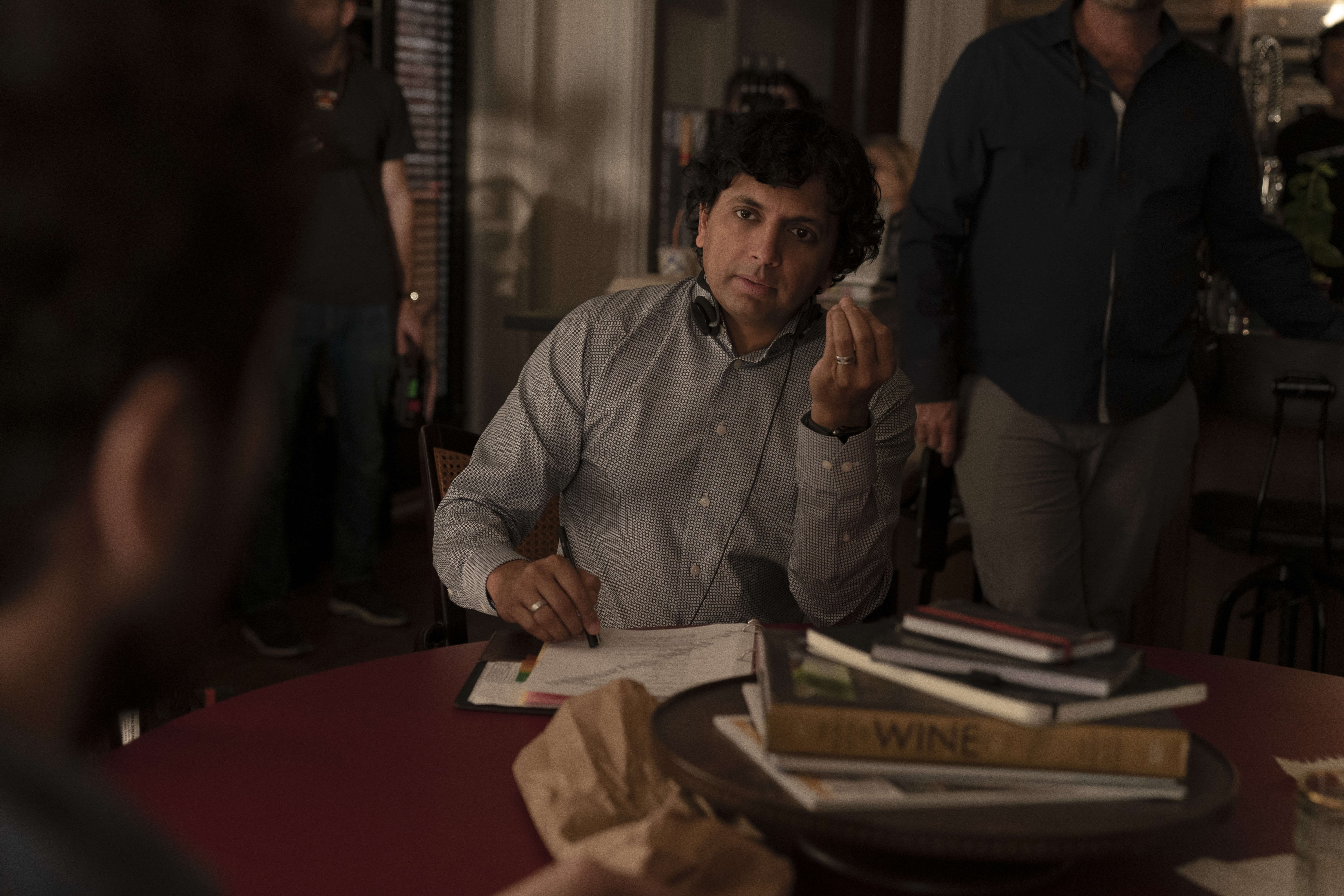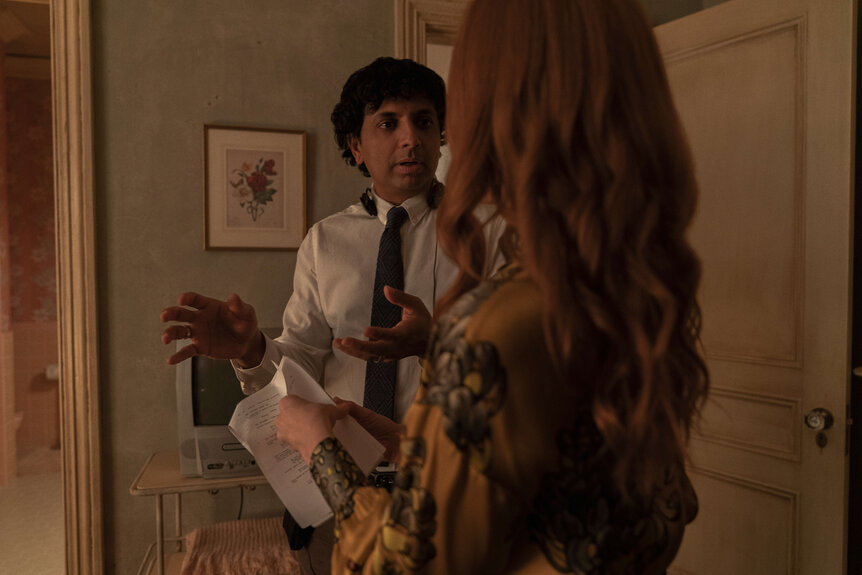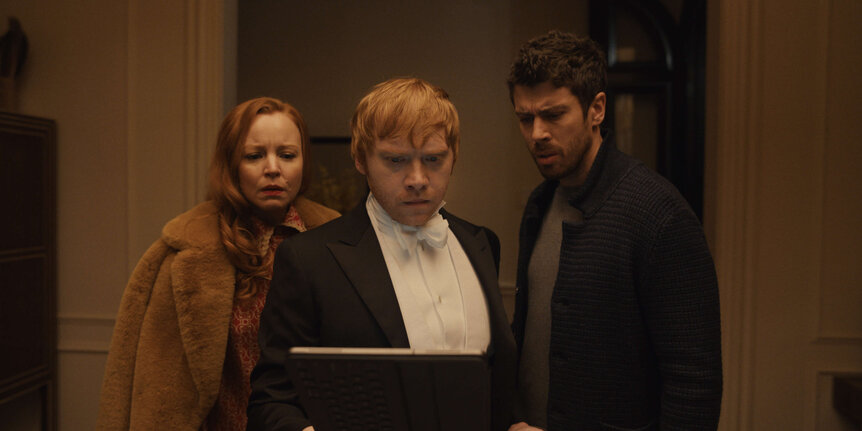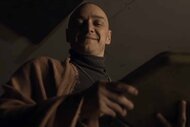Create a free profile to get unlimited access to exclusive videos, sweepstakes, and more!
M. Night Shyamalan finds his TV groove with Servant Season 2's 'giggle'-inducing black comedy

If you could pick a word that distills director M. Night Shyamalan's three-decade-long career, "roller coaster" is likely the most apt. From early high points such as the Academy Award-nominated The Sixth Sense (1999) and Unbreakable (2000) to subsequent low points with The Happening (2008) and the live-action adaptation of The Last Airbender (2010), he's weathered them all and remains a remote-by-choice player in the Hollywood game. This has led him to Servant, his second television series, which starts its sophomore season on Jan. 15 on Apple TV+.
In a Zoom interview with SYFY WIRE from his suburban Philadelphia studio complex, Shyamalan is the first to admit that he's learned plenty from projects that tanked or didn't go the way he wanted. In fact, After Earth (2013) and his first TV series, Wayward Pines (2015-2016), turned into personal pivot points with regards to how he would proceed with all of his creative projects going forward.
Smaller endeavors shot in Philly with a focus on stories that are doable within the bounds of his creative responsibility have become the benchmarks for his involvement with any project now. "When I say, 'I own my films,' or, 'I own my shows,' I do them very small so I can iterate as fast as I can with no ramifications," Shyamalan explains about his homegrown approach. "With [Servant], we can reshoot anything we want. And we do. It's the same house and the same actors and we go shoot it again and on and on. We do that."
Servant is a perfect example of Shyamalan adhering to his new creative mandate. It's also a response in many ways to what he's made before, movies and shows that were born of compromises. Having seen how that turns out, Servant is about him, and his collaborators, following their creative guts.
Last time we spoke, you had just finished the first season of Wayward Pines and you were honest about trying to find your way in the new medium. What did you take from that experience that influenced how you make Servant?
I would say I needed to do what I did in the movies, which is I decided to make smaller movies. I started that about six years ago. So I said my experience in TV was not the way I wanted it to be the first time. I asked [Fox] to shoot it in Philly and they said it would be cheaper to shoot in Agassiz [in British Columbia, Canada], so we shot it there. And there were a million factors. It was network TV and that was a whole thing. We had a final season that I had come up with, which I love, like blow your mind, love, but couldn't do it. And you know, all these things were just very upsetting. I couldn't execute it the way I wanted to ultimately.
And so I said, if I'm ever doing this again we're going to do this the way I'm doing my movies. I'm going to control it. We're going to do it smaller and I'm going to deliver the amount of material I think I can deliver. The half-hour format, the shooting here and owning it, and all of those things are part of the ability for me to have fun and control it. And if I'm gonna have my name on it, it should represent me. My limitations. That's what I say to everybody. It should represent my limitations, not any other circumstances. And so it's very exciting as we turned into the second season.
What was something from Season 1 of Servant that adjusted or changed how you approached Season 2?
I went, "Stop! We're not writing another episode until we figure out the whole show. This is a mystery and I can't keep telling a mystery until I know where we're going." That just for me, that's not for anybody else. It's just for me. And so we started to work everything out; all of it. I got writers and we started to work it all out. We were in the middle of it and shooting and we were starting to do it simultaneously and then the pandemic hit.
Depending on the project, the pandemic has either been a blessing or a curse. Was having a stop-down helpful for a show as enigmatic as Servant?
Yeah, it was one of those things that was for me and my process, it was exactly what I needed. I needed those months by myself to just work it through until I know the characters and I know that this is where I wanted to go. At first, I thought the pandemic would last four weeks and then I will be shooting in six weeks so I was racing. I had weeks to figure this out really quick you know, so I was writing and writing and writing and working it all out. It laid itself out in a way that I went, "Oh! I know what the remaining episodes need to be focused on and I know where we're going to go in Season 3." It moved from an idea with a kind of an inkling of where I wanted it to go to laying it all out.
Let's talk about Season 2 really diving into the black comedy of this heightened situation: of Dorothy's family trying to protect her from the truth about Jericho and instead they're just making everything unravel in the most ridiculous ways. Was there a concern it wouldn't jive with audiences?
I realized [black comedy] has been my instinct since I was a kid and I was not skilled enough to do it, was too scared to do it, or didn't have an environment that appreciated it. And so when I did The Visit, and I was like, "Screw y'all! I'm doing this openly. From now on. I'm gonna go down in flames, but we're gonna do a full, blown-out comedy/horror and that's all there is to it." I remember the screening, all the [focus audience] cards were like, "Am I supposed to laugh? I was laughing. Is this not working? Or this? Because I was laughing the whole time." And that tone started to grow and grow and grow 'til now. I do it all the time and in surveys, they don't go, "Oh, it's not working. I'm laughing at them." They know. It's dark humor, black humor; that's the tone. I love it. And so I want it everywhere. I enjoy it and it makes me giggle. My new movie is insane with that stuff. And I hope people know they're allowed to laugh.
One of the unique elements of Servant is that it's essentially a haunted house series. The action happens within the Turner's home, or in Season 2, is at least tethered strongly to someone in the home via an iPhone. How did that become a mandate of the narrative?
At the core of all of this is my artistic belief that you have to limit the colors you're using. That's important. When I'm talking to a composer, I'll say, "Hey, you have too many ideas and too many instruments. You need to limit." And I'll say that to the writers, always limit, limit, limit, and then paint with those limited colors. Apple, I think, for a long time didn't realize how serious I was that we're gonna be doing this whole thing from [the house]. And then I think some of the writers, too. I was like, "Nah, we're never leaving. We're never leaving it."
Anecdotally, one of the directors had storyboarded a scene that was in the script, but it was outside the house. And they went, "I'm gonna do it from the character's point of view about their feelings of the space." And I'm like, "They can't do that. I'm sorry." And then they were very upset. I said, "I'm sorry. You've got to use the phone." Even the DP was all sad, but I'm like, "'Dems the rules!" [Laughs.]
Your daughter, Ishana Shyamalan, directs and writes on multiple episodes this season. How was it being a dad as an executive producer with his daughter/employee?
I treated her the same as all the directors. I feel very avuncular to everybody that comes on [the show]. Even if they're older than me, I feel that way about everybody. I handpicked them. And I'm there to talk cinema with them. I'm there to encourage them to take risks. I'm encouraging them to get rid of their bad habits. And so, I'll say, "Hey, if you're gonna do a scene with two mid shots, we're gonna have a problem." They're gonna explain to me why they feel medium and then they feel the same medium. You're not going to have an answer, and so in that moment, know that you've abdicated your position as an artist, as a storyteller, before you come to me, because I'm gonna call you on it.
You need to take risks, you're gonna need to commit, you're gonna make mistakes, and we're gonna reshoot those mistakes. That's the fact. That's where we are. I'm going to do the same thing. And that's going to allow you to iterate as much as you want, as fast as you want. I said the same thing to her. And I didn't really bother her on the set too much. I didn't want to hover. But I knew it was going to be a moment. I knew how talented she was. I was bringing in a ringer. And I know that Apple, they didn't say anything, but I'm sure they were like, "Yikes. Uh-oh. This is where the train starts going off the tracks. This is where the insanity starts, right?" I was like, "Just trust me on this." And then, swear to God, when they saw her episode they went, "That may be our favorite episode." And I was like, "I told you and that wasn't me." I did what I did on all the other episodes: I supervised everything, and I edited it but I didn't do anything different than I did for any of the other directors.
And then she came in and did rewrites and then she wrote Episode 7 and then she wrote a lot of Episode 8 and then she wrote the finale, Episode 10. It's amazing. She became a huge part of the team and the storytelling. The only reason I don't get her more is she's still finishing up college. [Laughs.]
You've said Season 1 was about what happened to Jericho and Season 2 is about the cult. Since you've outlined Season 3, what is the theme of what's to come?
Oh, wow! I mean, can I tell you? I know and I've been saying it to the writers. I'm just thinking, I don't think I can tell you. But you will know exactly where we're going in the finale of this season.
Servant Season 2 premieres on Jan. 15 exclusively on Apple TV+, with new episodes premiering weekly every Friday.




























